Announcing our first International Research Network grant awards

We are pleased to announce the first awards made via our Seed Funding and Small Research Grants scheme. We have been able to award funding to fifteen projects in this first round of funding.
Projects will focus on conducting socially relevant research across a variety of aspects in the field of religion and science in society, in a broad range of countries. More information about the aims of our Grants Programme including the Seed Funding and Small Research Grant scheme can be found here.
We are grateful to the Templeton Religion Trust, our reviewing committee and external experts for making these awards possible.
Awarded projects:
Sally Barker, Graduate Student, Psychology Department, The University of Maine Co-Investigator: Dr Jordan P. LaBouff
The Impact of Higher Education on the Science-Religion Relationship: A Social Identity Perspective This project will examine the impact of higher education on the science-religion relationship from a social identity perspective in two phases. In phase one, mixed-method datasets of qualitative and quantitative data looking at changes in religious social identity among science majors at a public STEMM-focused university and a private Christian university will be analysed. In Phase 2 pilot study data from a nationally representative sample will be investigated for causal roles in perceptions of compatibility and the project team will produce manuscripts based on findings. The project will also be presented at the Society for Personality and Social Psychology Annual Convention. The results from this project will contribute to a better understanding of social identity and the religion-science relationship.
Vivian Dzokoto, Associate Professor, Virginia Commonwealth University
Understanding Akan Ways of Knowing: A Proverb Analysis This study will investigate narratives about knowing and believing inherent in proverbs of the Akan of Ghana (West Africa). The analysis will be informed by psychological perspectives about knowledge and belief. Using a compendium of 7015 Akan proverbs – the largest collection of Akan proverbs to date, the P.I will conduct a thematic analysis of the proverbs to identity narratives and/or patterns of knowledge-seeking and believing inherent in Akan proverbs. Project deliverables will be: a research article, a conference presentation, a seminar hosted at Virginia Commonwealth University and a blog post.
Tiago Garros, Project Leader, Associação Brasileira de Cristãos na Ciência (ABC2) Co-Investigators: Dr Jonathan Simões Freitas, PhD; Marcelo M. Braga Cabral
Intellectual Virtues and Vices in Science and Religion Groups in Brazil: A Survey This project will conduct research in order to evaluate what factors affect conversations between science and religion. It will focus on evangelical science and religion study groups in Brazil. The project team will analyse group tendencies towards virtuosity and viciousness and will study the implicative associations of these profiles to produce data sets. This work is especially relevant in a context where religious communities have a historic record of denying scientific theories that they may perceive as hostile to their faith. The project aims to contribute to a better understanding of the factors that play out in these dynamics of relating science and religion in order to foster a more harmonious and fruitful dialogue between these important cultural forces. The study will result in journal articles and blog posts, and a live-streamed event to share results.
Anna Halafoff, Associate Professor of Sociology, Deakin University Co-Investigators: Professor Cristina Rocha; Dr Enqi Weng; Professor Andrew Singleton; Dr Alexandra Roginski
(Con)spirituality, Science and the COVID-19 pandemic in Australia: Material and Digital Practices This project aims to investigate the nexus between (con)spirituality and science in Australia during the COVID-19 pandemic; to provide a deeper understanding of this phenomena and the processes of radicalisation occurring within spiritual communities. It will also illuminate internal diversities and complexities within communities. The project team will interrogate the full spectrum of how Australian self-identified spiritual persons and groups engage with science in material and digital practices. Outputs will include a colloquium, journal articles and a (con)spirituality website and blog.
Siri Hettige,Chair Person Centre for Development Research and Innovation (CDRI) and Emeritus Professor University of Colombo, Centre for Development Research and Intervention (CDRI) Co-Investigators: Veranga Kavithri Wickramasinghe; Nedha de Silva
A pilot project on Public Perceptions on Science, Religion and Ethno-religious Tensions in Sri Lanka (A study based on the effects of Covid-19 Pandemic on Sinhala Muslim ethno-religious tensions) This project explores public perceptions on science, religion and ethno-religious tensions in Sri Lanka. It specifically looks at how the Covid- 19 pandemic presents challenges to public health and creates a socio-psychological environment fuelling ethno-religious tensions. The study adopts a sociological perspective to understand how public health challenges can interact with scientific and religious beliefs, practices and attitudes in a pandemic situation and, in turn, influence the relationship between people and the discourses, both religious and scientific. It will conduct a baseline survey to understand the scientific and religious orientation of the public and gather qualitative data from different samples of respondents. The findings of the study will be disseminated in academic journals. In addition, the outputs will also be used to generate interest among academics, policy makers and the general public on important aspects of the nexus between science and religion.
Gabriela Irrazábal, Adjoint Researcher, Consejo Nacional de Investigaciones Científicas y Técnicas (CONICET)
Science and Catholicism: Perspectives and Circuits of Dialogue between Contemporary Europe and Argentina in Six Scientific Areas (Epistemology, Bioethics, Genetics, Reproductive Medicine, Embryology, Psychiatry and Neuroscience) This project seeks to conduct a socio-historical analysis of the relationships between science and religion in Roman Catholicism, using multiple case study analysis. It will explore the articulation among beliefs, scientific disciplines and theological perspectives by studying institutional spaces and the main trajectories1 of actors who promote and implement linkages between science and religion in specific cases at different points in time. The study will begin with a comparative analysis of cases from six scientific fields, in the framework of global and local religious-epistemic communities. The project will follow a qualitative methodology with a combination of interviews, document analysis and observation. Alongside tailored reports related to data gathering and analysis, a bimonthly seminar, open to anyone interested (academics, general public) will be carried out to present preliminary project results, and an international workshop will also be held. The workshop is expected to gather specialists in the study of the relationships between science and religion from Chile, Uruguay and Brazil.
Will Mason-Wilkes, Research Fellow, University of Birmingham
The Role of ‘Science’ in Atheist and Non-Religious Cultural Identities This project will investigate how atheist and other non-religious individuals in the UK involve ‘science’, broadly conceived as a cultural institution represented in various mediated forms in public, in their identities, world-ordering and meaning making. It will seek to complexify understandings of the role ‘science’, as a mediated cultural institution, can and does play in individuals’ lives in a modern democratic society. This research will act as a pilot for a larger, extended project that will further interrogate the relationship between science, media and belief in 21st century democratic societies. The project activity will include interviews and conference papers, a peer reviewed journal article, blog posts and book proposal will form the project outputs.
Heather Mellquist, Postdoctoral Research Fellow, Arizona State University
Communion and Contagion in South Korea The project will conduct field research in Seoul, South Korea to explore the critical social role that Christianity has played in social and political responses to SARS-CoV-2. While public conflicts between conservative churches and public health directives have garnered significant attention in both domestic and international media, less attention has been given to the wide range of church responses to the pandemic. This project will study the experience of Korean pastors and lay Christians during the pandemic and use this research to inform English-speaking public understandings of Christianity in the pandemic. Findings will be shared in collaboration with the internationally-syndicated radio program PRI’s The World and through print media.
Jaume Navarro, Ikerbasque Research Professor, University of the Basque Country
Engineers in Spanish “Science and Religion”. Historical origins of myths and contemporary uses This project seeks to explore the historiographical background of the conflict thesis in Spain and the way these historical origins manifest in contemporary Spanish public opinion. To achieve this goal, the P.I. will analyse scientific, popular and, above all technological journals in the period 1874-1931, to compare the narratives on science and religion beyond the usual and largely imported cases, such as Evolution, Cosmology or the Galileo affair, with a particular emphasis on the attitudes of engineers. The project will explore the extent to which the conflict thesis is still present in disputes about contemporary science and the extent to which such arguments are a continuation of those shaped one hundred years earlier. The period 1874-1931 has a particular significance in the history of Spain due to its relative political stability between the two republics. The project will produce a bibliometric analysis, a blog series and manuscripts.
Shiri Noy, Assistant Professor of Sociology, Denison University
Kindness during COVID-19: Science, Religion, and Uncertainty This project seeks to examine how religious and secular Americans view kindness in the context of COVID-19. It seeks to examine how science and faith are mobilized as coping mechanisms with uncertainty and how views of kindness, in particular, compassion and helping, are viewed in the context of the pandemic. It will also seek to untangle conceptions of kindness across ingroup and outgroup, and interpersonal kindness as compared with structural, and how these understandings may be related to belief and trust in science. The project will collect quantitative and qualitative data from surveys and interviews and work to advance empirical and theoretical understandings of how uncertainty shapes and mobilizes understandings of kindness across belief communities.
Roman Palitsky, Postdoctoral Research Associate, Brown University Co-Investigators: Dr Jared Lindahl; Dr Willoughby Britton; David Cooper
Dynamics of Science and Religiosity in the context of Meditation-Related Challenges: Processes of Meaning-Making among Practitioners of Buddhist Meditation in the West
This project examines scientific and religious worldviews among practitioners of Buddhist meditation in the West who have experienced meditation-related challenges. It aims to identify and describe the language that meditation practitioners use to interpret their challenging experiences in relation to religious and scientific frameworks, as well as the ways in which these worldviews change on account of undergoing meditation-related challenges; as well as seeking to examine how religious and scientific worldviews both impact and are impacted by practitioners’ responses. Outcomes from this project will contribute to ongoing efforts to provide didactic and therapeutic tools for meditation-related challenges among Westerners, whether they are practicing meditation in secular settings and holding a scientific worldview or in the context of a religious path.
Steven Pirutinsky, Director of Research at the Center for Anxiety and Associate Professor of Clinical Social Work at Touro University, JPSYCH Inc. Co-Investigators: Aaron D. Cherniak, Dr David. H. Rosmarin
Religion, Science & COVID-19: Predictors of Adherence to Health Directives and Mental Health among American Jews The project will examine the effects of religious and scientific beliefs on responses to COVID-19 in the underrepresented and diverse cultural context of American Jews. Notably, the Jewish community is bound by similar culture yet highly diverse in its religiosity, providing a unique culturally-controlled context to examine religion and health. The project team will examine how trust in God and religious leaders (especially regarding health), and trust in elected officials, scientists, and medical professionals predicts behavioural and emotional responses to the pandemic. Ultimately, the project will promote dialogue on sociocultural narratives about science and religion with rich scientific data, towards fostering scientific and public discourse about these pertinent matters. Outputs of the project will include a manuscript, scientific abstracts for presentations at conference, and the project team will disseminate findings to the Jewish community in current newsletters as well as via individual messages to Jewish organizations.
Maria Roginska, Associate Professor, Pedagogical University of Cracow.
The imagined universes. The role of cultural imaginary in formation of (non-) religious ideologies of Post-soviet natural scientists
The project will test the hypothesis which argues that imagination together with epistemology, influences individual responses to scientific and religious ideas. It will focus on élite natural scientists from three post-Soviet countries with different dominant religions and will explore questions related to how relevant religions contribute to the adoption and interpretation of scientific ideas by individual scientists and will look at the demise of the USSR in the context of this study. The outcome will be a better understanding of the cultural and historical mechanisms responsible for science-religion relations, and the formulation of new theoretical approaches.
Rachel Stein, Associate Professor, West Virginia University Research Corp.
Lived Experiences of Closed Religious Congregations During a Global Pandemic: The Amish and Mennonite Response to COVID-19 Medical Guidelines This project will advance the religion/science literature by identifying how CRCs understand and respond to medical information during the current COVID-19 pandemic, how this affects the practice of social distancing, and whether this varies by country and congregational context. This project will study Amish and Mennonite CRCs by collecting data from two widely circulated Amish/Mennonite newspapers that publish letters from scribes located across the world. The project team will analyse this data, and present findings within a conference presentation, a manuscript to a peer-reviewed journal, and also present findings in a public forum at the Amish and Mennonite Heritage Center in Holmes County, Ohio.
Natalia Zarzeczna, Research Associate, University of Amsterdam Co-Investigators: Dr. Paul Hanel, Dr. Bastiaan Rutjens, Prof. Geoffrey Haddock
The relationship between religion and science in practice: The role of religiosity in complying with scientific health advice The project proposes to explore the role of religiosity in compliance with differentially framed health-related advice based on scientific findings. It will focus on studying the religion-science relation by investigating whether religiosity plays a role in compliance with scientific health advice cross-culturally in order to determine effective ways of communicating such advice to people with diverse religious beliefs cross-culturally. The team will look at ways to encourage the public to re-evaluate the stereotypic perceptions of religious people as science sceptics. Outputs will include Research articles, blog posts, a YouTube video and Open access datasets.
